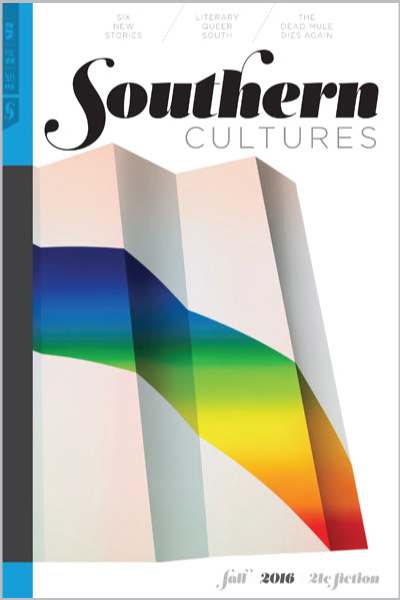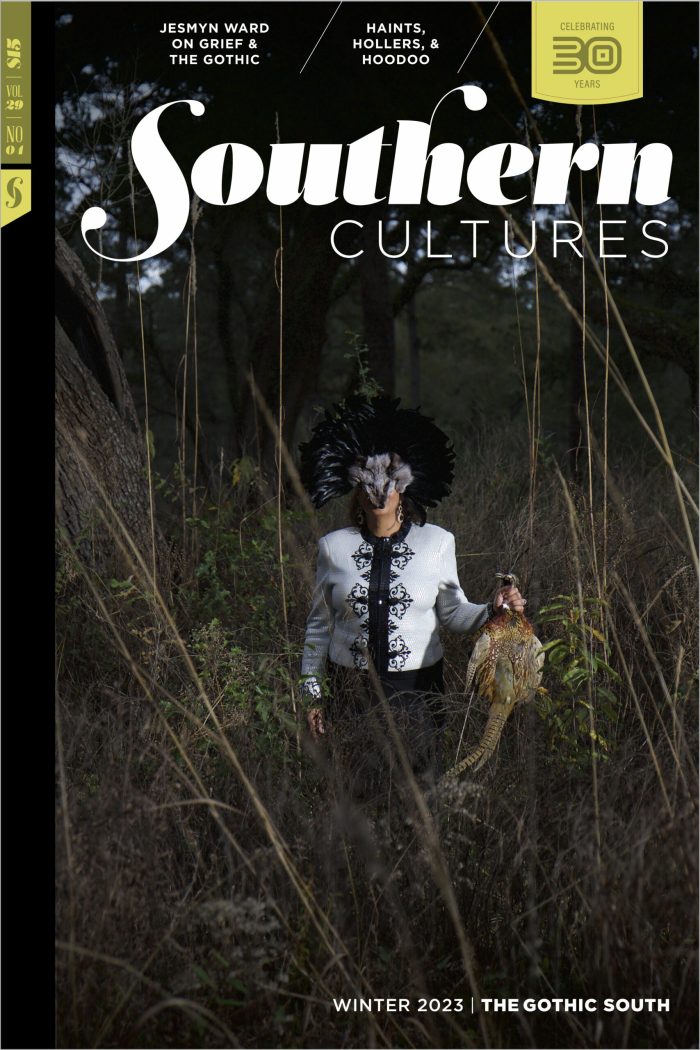Essay
by Harry L. Watson
“In this Newest South, novels about tragic mulattoes or doomed aristocrats seem hopelessly out of place, and some writers and critics now speak boldly of “post-southern” literature. At the very least, it’s time to take a look at twenty-first-century southern fiction.” In his notorious 1917 roast of southern backwardness, “The Sahara of the Bozart,” H. »
by Daniel Wallace
For our 21c Fiction Issue, we consulted crackerjack writer, illustrator, and sleuth Daniel Wallace. The Big Fish traipsed around the Smoky Mountains and a hole somewhere in Alabama, and consulted with a cat named Eudora Welty and a writerly dog named Jake to create for us these “Lesser-Known 21st-Century Southern Writers.” Jimmy Pringle The Hopewell Sisters Mrs. Sedgewick and »
by Patrick E. Horn
“Standard descriptions of what makes southern literature and culture distinctive (if not ‘exceptional’) are by now familiar to most bibliophiles . . . But such symbols of southernness are fraught with stereotypes, and they rarely tell the whole story.” When we asked some of our favorite writers, scholars, and literary critics for their thoughts on »
Art
by Robert Gipe
GENE First day of July I was thumbing the Caneville Road. I’d walked off another of Brother’s clean-up jobs, mine sludge up to my pant pockets, throat raw, hands itching and broke out. For eight dollars an hour I told him I couldn’t do it. Told him I’d walk back to Canard. He didn’t like »
Fiction
by Julia Ridley Smith
When my father was a boy during World War II, he says, he was at the movies with his father one evening. The newsreel had just finished and the first chords of the feature’s soundtrack had begun, when the usher came down the aisle, shining his flashlight and saying my grandfather’s name. They followed him »
A Southern Fiction Roundtable
by Southern Cultures
In an essay published in our pages in 2000, our friend Jerry Leath Mills surveyed around 30 prominent twentieth-century southern authors, which led him “to conclude, without fear or refutation, that there is indeed a single, simple, litmus-like test for the quality of southernness in literature, one easily formulated into a question to be asked »
by Crystal Wilkinson
This story first appeared in our 21c Fiction Issue (vol. 22, no. 3: Fall 2016). Black shank nearly took the tobacco crops that summer, and then a plague of grasshoppers swooped down to take the garden. I was spraying vinegar on the tomato plants to stave off the bugs while Gloria was out by the »
by Minrose Gwin
“There is one thing I haven’t told.” After I came home from going away and the Russians decided not bomb us into smithereens, Dad said it was time for me to go back to school. I didn’t need urging. My old life, BC, Before Child, my humdrum, what-are-we-going-to-have-for-supper life, had begun to seem like a »
by Mesha Maren
This story first appeared in the 21c Fiction Issue (vol. 23, no. 3: Fall 2016). I left Render early and hitched all morning. Five rides. Proselytizers and moralizers every one, each with a warning about the evils of hitchhiking, the evils of teenage girls out in the world alone, the evils of cigarette smoking and »
by Odie Lindsey
“What else is there to do but follow history? Men go to war to be men worth a damn. Their statues and movies are everywhere, forever.” Bars and booze and lacquer and glass and smoke and tv and tourists and shots, and pit-stop at Randall’s to chop up a Xanax, to snort then smoke then »
Padgett Powell’s Manly South
by John Moran
“In the predominantly working-class and sometimes rural spaces where Powell’s straight and gay characters cavort together, shoot the shit, or knock each other to the ground, homophobia can exist alongside friendliness and hospitality toward gays, and anti-homophobia can reinforce patriarchy.” Padgett Powell has a habit of saying provocative things, and one such line that struck »
Monique Truong’s Bitter in the Mouth and the Twenty-First-Century Southern Novel
by Justin Mellette
“‘My first memory was a taste. For most of my life I have carried this fact with me not as a mystery, which it still is, but as a secret.’” Monique Truong’s 2010 novel Bitter in the Mouth opens with narrator Linda Hammerick reminiscing about her close relationship with her great-uncle, before introducing us to »
Contemporary Cultural Nakedness and the Rise of Grit Lit
by Zackary Vernon
“The Rough South offers either the illusion of being clothed culturally, if one identifies with the characters of this literature, or an escape to the ‘real South’ . . . if one believes that the working class retains an authenticity that has been largely flattened in the middle and upper classes.” The past three decades »
Poetry
by Atsuro Riley
It starts with the lamp that lamped our night our dirt. Cause of this (wear-balded) red-mud ring going glow. The old ever-voice (with the tear through it) intonation, riveting. Souls and appetites (from holler, brink, and gully) lured and drawn. The story-man encircling us binding us by lard-torch and ditty. So. In the beginning. And »
by Dorothy Allison
In the summer of 2015, we filmed a short interview with Dorothy Allison, discussing the idea of southern mothers in conjunction with Keira V. Williams’s essay, “‘Between Creation and Devouring’: Southern Women Writers and the Politics of Motherhood.” Today, in collaboration with our 21c Fiction Issue, we bring you excerpts of our conversation. “Life constructs or mitigates »
Art
by Fred J. Porter
Southern Cultures is proud to announce Fred J. Porter as the inaugural recipient of the Druscilla French Prize in Undergraduate Creative Writing. The prize will be given annually to a distinguished graduate of the Creative Writing Program at the University of North Carolina at Chapel Hill. Charlie’s last day at work had gone like this: somebody, either out »





